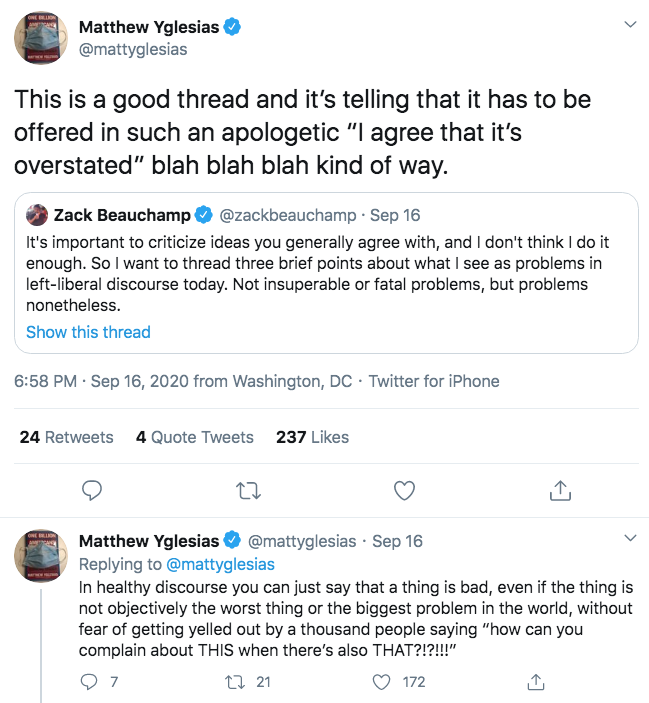Their own worst enemy
This set of Matt Yglesias tweets caught my eye:

Yglesias is clearly right, but there’s an even more important point that needs to be emphasized. When left-liberals like Zack Beauchamp criticize their own side, they are helping their cause and hurting Trump. I suspect that many on the left believe exactly the opposite, that Baeuchamp is giving aid and comfort to the enemy.
The cancel culture promulgated by SJWs is one of the few things Trump has going for him this year, given that America is obviously not “great again” in 2020. SJWs believe that no one who voted for Trump should be allowed to have a job in academia, publishing, high tech, and many other industries, at least if their choose to honestly speak their minds. That’s almost half of the country! But it’s even worse than that; SJWs also believe that outspoken swing voters like me should not be allowed to have a job in any intellectual field. Only those who adhere to a radical left wing ideology should be able to work in those fields, unless they keep their mouths shut. Heck even Marxists like David Shor now get cancelled.
I hope I don’t need to explain that the cancel culture is extremely unpopular among the sort of swing voters who will determine the outcome of the election. Even many Democratic voters are opposed. So those left-liberals who try to get their own side to avoid the worst excesses of political correctness are actually helping the broader progressive cause.
I see modern conservatives as crafty villains, and modern leftists as well meaning fools. The left seems to think the best way to get white working class people to vote against Trump is to criticize Bernie Sanders for saying “all lives matter”. Seriously.
Trump’s operatives are privately gleeful watching the left commit political suicide.
A recent comment by PRC caught my eye:
Slightly offtopic, but fits into that note with Central Americans. There was a funny graph I saw awhile back where it showed that Trump was doing best (around 50+%) support with Central American(MesoAmerican Indigenous Hispanics) versus around 30% with the more “White” Hispanic groups(Venezuelans, Columbians, etc).
The most bizarre political phenomenon I have seen is that Trump does really well with non-Whites he routinely attacks(Indigenous people, Muslims), but he does bad with groups he doesn’t really overtly attack(East Asians, Jews, African Americans). I think he got 7x more Muslim support in 2016 and 2018 than McCain and Romney.
Obviously with TPS [i.e. deporting refugees], this is an extreme attack, but he tried to do it before and he was still relatively popular with those voters, what gives?
There’s a double irony here, which needs to be unpacked. Immigration restrictionists often argue that we don’t want to accept people from developing countries because they will bring along their illiberal cultural values. They may end up voting for socialists or authoritarian nationalist demagogues. One irony is that restrictionists were essentially warning that immigrants would vote for people like Trump. And the second irony is that maybe they will!
There is a very high rate of intermarriage among whites, Asians, and Hispanics. Thus I’ve always assumed that it’s only a matter of time until the white and Hispanic working classes voted in the same way. In the 1960s, that would have meant voting Democratic, in the 2040s it might mean voting Republican. Indeed that’s my prediction. And when the make up of political parties changes, their positions on the issues will also change.
I’m not sure if it’s true that Hispanics are trending toward Trump, but let’s consider why that might be the case. Further immigration could be seen as providing competition for Hispanic workers that are already in America. Yes, some Hispanics fear deportation, but I suspect that very few Hispanic voters fear deportation.
My own view is that immigration should be greatly expanded (one billion Americans!), and this view in no way depends on whether I happen agree with the political views of most potential immigrants. My view on immigration is based the the 64,000 foot high perspective, from which I have no reason to assume that my political views on the appropriate size of government are superior to Paul Krugman’s views. My political views shape my views on public policy, they do not shape my views on the appropriate ideology of immigrants.
In this blog, I probably appear overconfident in my beliefs. But I can assure you that I have enough self awareness to understand that I’m nobody special, and that there’s no objective reason to privilege my political views over anyone else’s.
As an analogy, I predict that Trump will win. But there is no objective reason to favor my prediction over the betting market’s current view that Biden will win.

